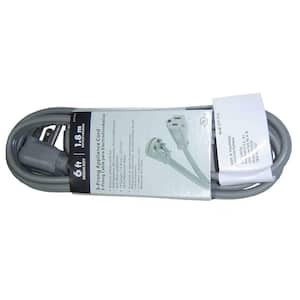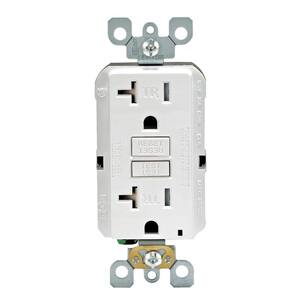gsleaf
Well-known member
Is it safe to use an extension cord on the standard trickle charger? If so how do I know which kind to purchase? I would love to be able to use a six foot extension cord.


This 9-footer is a better cord (12 gauge vs. 14 gauge for the 6' cord). Either would be fine but this one is better.gsleaf said:So obviously safety is my first concern here.
Should I go with this 9 ft. cord or should I just stick with the 6 ft. one listed above?
http://www.homedepot.com/webapp/wcs/stores/servlet/ProductDisplay?storeId=10051&langId=-1&catalogId=10053&productId=202353559&R=202353559#specifications" onclick="window.open(this.href);return false;
The 9' is a 20a cord with a NEMA 5-20 plug. The neutral prong is rotated 90 degrees and will not fit in a standard outlet with the blades parallel. It must have a 20 amp NEMA 5-20 outlet ..... also available at Home Depot. The neutral on the 5-20 outlet will have a "T" slot to accept 5-15 or 5-20.gsleaf said:So obviously safety is my first concern here.
Should I go with this 9 ft. cord or should I just stick with the 6 ft. one listed above?
http://www.homedepot.com/webapp/wcs/stores/servlet/ProductDisplay?storeId=10051&langId=-1&catalogId=10053&productId=202353559&R=202353559#specifications" onclick="window.open(this.href);return false;

smkettner said:The 9' is a 20a cord with a NEMA 5-20 plug. The neutral prong is rotated 90 degrees and will not fit in a standard outlet with the blades parallel. It must have a 20 amp NEMA 5-20 outlet ..... also available at Home Depot.gsleaf said:So obviously safety is my first concern here.
Should I go with this 9 ft. cord or should I just stick with the 6 ft. one listed above?
http://www.homedepot.com/webapp/wcs/stores/servlet/ProductDisplay?storeId=10051&langId=-1&catalogId=10053&productId=202353559&R=202353559#specifications" onclick="window.open(this.href);return false;
The neutral on the 5-20 outlet will have a "T" slot to accept 5-15 or 5-20.
This put me back with the 15a cord. 6' or 9' is irrelevant. The #12 wire is better. The plug must match the outlet.

http://www.homedepot.com/webapp/wcs..._-SearchPLPHorizontal1-4-_-NA-_-202514681-_-N
smkettner said:Yes a 20a outlet would need to be on a 20a circuit to meet code afaik.
It is also common to have multiple 15a outlets on a 20a circuit and should be fine to just swap in a 20a outlet.
Best to verify what you have before making changes.
While technically the 12ga 9ft cord is "better" than the 14ga 6ft cord, in terms of voltage drop, the two cords are exactly the same.DoxyLover said:This 9-footer is a better cord (12 gauge vs. 14 gauge for the 6' cord). Either would be fine but this one is better.gsleaf said:So obviously safety is my first concern here.
Should I go with this 9 ft. cord or should I just stick with the 6 ft. one listed above?
http://www.homedepot.com/webapp/wcs/stores/servlet/ProductDisplay?storeId=10051&langId=-1&catalogId=10053&productId=202353559&R=202353559#specifications" onclick="window.open(this.href);return false;
Logic prevails. Good work drees.drees said:While technically the 12ga 9ft cord is "better" than the 14ga 6ft cord, in terms of voltage drop, the two cords are exactly the same.
Both will drop 120V to 119.6V with a 12A load.
So IMO - go with the shorter cord that fits your existing outlet.
Good catch. Sorry I missed that.smkettner said:The 9' is a 20a cord with a NEMA 5-20 plug. The neutral prong is rotated 90 degrees and will not fit in a standard outlet with the blades parallel. It must have a 20 amp NEMA 5-20 outlet ..... also available at Home Depot. The neutral on the 5-20 outlet will have a "T" slot to accept 5-15 or 5-20.gsleaf said:So obviously safety is my first concern here.
Should I go with this 9 ft. cord or should I just stick with the 6 ft. one listed above?
http://www.homedepot.com/webapp/wcs/stores/servlet/ProductDisplay?storeId=10051&langId=-1&catalogId=10053&productId=202353559&R=202353559#specifications" onclick="window.open(this.href);return false;
This put me back with the 15a cord. 6' or 9' is irrelevant. The #12 wire is better. The plug must match the outlet.

http://www.homedepot.com/webapp/wcs..._-SearchPLPHorizontal1-4-_-NA-_-202514681-_-N
Enter your email address to join: